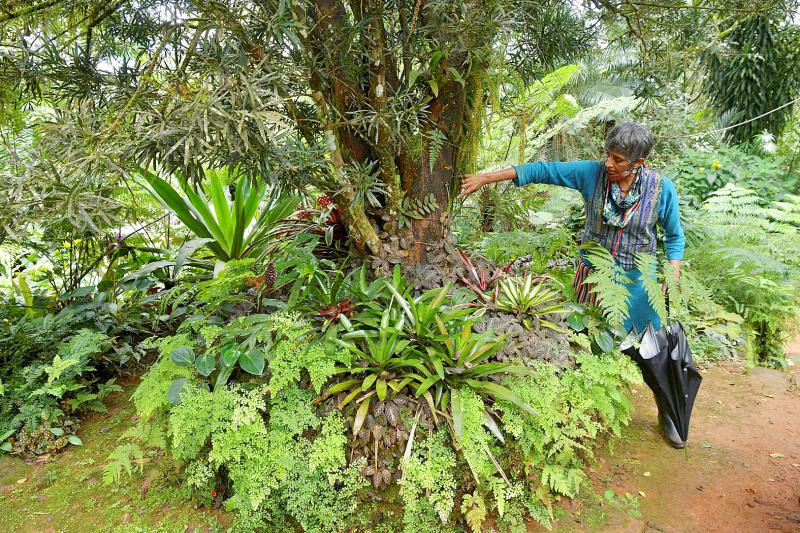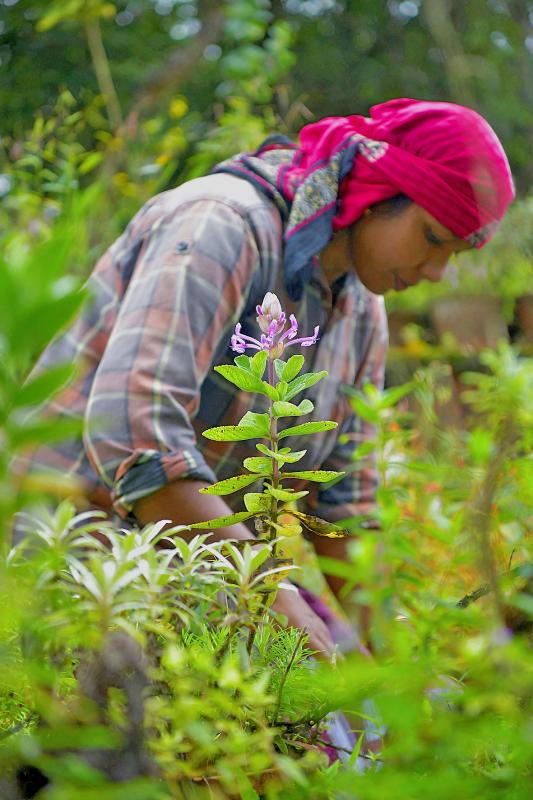As deforestation and climate change ravage India’s UNESCO heritage-listed Western Ghats mountain range, an all-female rainforest force is battling to protect one of the area’s last enclaves of biodiversity.
The region is home to at least 325 globally threatened flora, fauna, bird, amphibian, reptile and fish species but the International Union for the Conservation of Nature has ranked its outlook as a “significant concern.” But at Gurukula Botanical Sanctuary a group of 27 women act as guardians of the rare ferns, tree-hugging mosses and thousands of other plants that may otherwise be lost forever. “We are trying to salvage what is possible. It is like a refugee camp,” said Suprabha Seshan, one of the curators at the reserve.
It is also like a hospital.

Photo: AFP
“The intensive care unit is in the pots and then when you take them out that’s like the general ward where they get other forms of primary health care,” Seshan added.
She estimated that more than 90 percent of the forests once graced the area have disappeared, a situation she describes as an ecological “holocaust.” Gurukula was created as a haven for the native flora struggling for survival because of global warming and human encroachment, in the hope of slowly repopulating the region with indigenous plants. Gurukula, which means a “retreat with a guru” was set up 50 years ago by German conservationist Wolfgang Theuerkauf.
Theuerkauf, who became an Indian citizen in 1978 and died seven years ago, started with seven acres of forest, today it is 10 times that size.

Photo: AFP
‘THIS FOREST IS OUR GURU’
“Wolfgang said ‘this forest is our guru,’” Seshan said.
Three generations of “rainforest gardeners” — women from local villages in the hot and humid Kerala state — have worked with botanists to build up the sanctuary. Dressed in big boots — to protect against cobras and the pitiless insects — and brightly colored tunics, their hair tied under scarves, the women put in long days in the forests, the sanctuary’s greenhouses and its nursery.
They replant the suffering flora, sift compost and seeds and make a malodorous natural pesticide from cow urine.
“We have between 30 and 40 percent of the Western Ghats flora under conservation here,” added Seshan. The work is becoming increasingly crucial.
The region won its UNESCO listing in 2012 in part because it is one of the world’s biodiversity hotspots, but in its 2020 World Heritage Outlook report, the IUCN warned of the threat of encroaching human activity and habitat loss.
It said: “50 million people are estimated to live in the Western Ghats region, resulting in pressures that are orders of magnitude greater than many protected areas around the world.”
Seshan, who has worked at the sanctuary for 28 years, has seen things deteriorate first hand.
“When I came here plastic was still not a part of our culture,” she said. “I remember when Wolfgang found the first plastic bag in the river, he said: ‘civilization has arrived.’”
TRANSPLANT SUCCESS
Fighting off bloodsucking leeches that thrive in the humidity, the rainforest gardeners tend to a multitude of endangered ferns, flowers and herbs that grow around the rocks and in the shade of tropical trees.
The small plants of the Western Ghats are vulnerable to rising temperatures, rainfall fluctuations and the loss of habitat, Seshan said.
“The more the climate changes, the more their reproductive life strategies have to change to adapt.”
Laly Joseph, another of the senior gardeners, scours the mountains for species that need to be moved to Gurukula for intensive care. She tries to find simple ways to reproduce the natural conditions for each species being cared for. It is also carefully listed in an inventory.
Joseph showed off an Impatiens jerdoniae with red and yellow flowers that had been struggling before being nurtured and transplanted on to a tree. Three years on it is thriving.
Joseph, who has worked at the sanctuary for 25 years, says saving a rare species and seeing it live again in a forest is incredibly satisfying.
“They’re happy here, I am happy when they’re happy,” Joseph said of the plant. But she fears the increasingly unpredictable climate may destroy their work. The Western Ghats normally get up to 500 centimeters of rain a year, but the monsoon is increasingly erratic.
The plants are struggling to cope, Joseph said.
“They wilt, they can’t pollinate, they don’t get seeds. That is the way you lose species,” she added. “I suffer when a tree has fallen, when the rainforest dies.”

Google unveiled an artificial intelligence tool Wednesday that its scientists said would help unravel the mysteries of the human genome — and could one day lead to new treatments for diseases. The deep learning model AlphaGenome was hailed by outside researchers as a “breakthrough” that would let scientists study and even simulate the roots of difficult-to-treat genetic diseases. While the first complete map of the human genome in 2003 “gave us the book of life, reading it remained a challenge,” Pushmeet Kohli, vice president of research at Google DeepMind, told journalists. “We have the text,” he said, which is a sequence of

On a harsh winter afternoon last month, 2,000 protesters marched and chanted slogans such as “CCP out” and “Korea for Koreans” in Seoul’s popular Gangnam District. Participants — mostly students — wore caps printed with the Chinese characters for “exterminate communism” (滅共) and held banners reading “Heaven will destroy the Chinese Communist Party” (天滅中共). During the march, Park Jun-young, the leader of the protest organizer “Free University,” a conservative youth movement, who was on a hunger strike, collapsed after delivering a speech in sub-zero temperatures and was later hospitalized. Several protesters shaved their heads at the end of the demonstration. A

Every now and then, even hardcore hikers like to sleep in, leave the heavy gear at home and just enjoy a relaxed half-day stroll in the mountains: no cold, no steep uphills, no pressure to walk a certain distance in a day. In the winter, the mild climate and lower elevations of the forests in Taiwan’s far south offer a number of easy escapes like this. A prime example is the river above Mudan Reservoir (牡丹水庫): with shallow water, gentle current, abundant wildlife and a complete lack of tourists, this walk is accessible to nearly everyone but still feels quite remote.

In August of 1949 American journalist Darrell Berrigan toured occupied Formosa and on Aug. 13 published “Should We Grab Formosa?” in the Saturday Evening Post. Berrigan, cataloguing the numerous horrors of corruption and looting the occupying Republic of China (ROC) was inflicting on the locals, advocated outright annexation of Taiwan by the US. He contended the islanders would welcome that. Berrigan also observed that the islanders were planning another revolt, and wrote of their “island nationalism.” The US position on Taiwan was well known there, and islanders, he said, had told him of US official statements that Taiwan had not